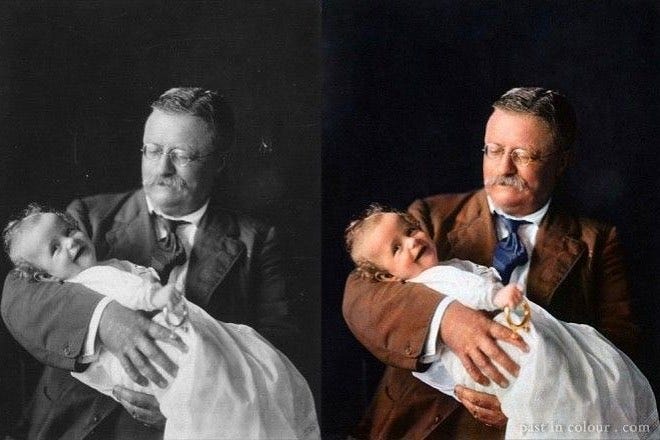No amount of intellectual brilliancy or of material prosperity or of easiness of life can atone
A century before alarm bells sounded over the fertility crisis and demographic replacement, Theodore Roosevelt condemned personal "independence" in favor of strong, healthy American families.
At the turn of the twentieth century, two women from New York’s upper class worked pseudonymously as factory girls for several months to understand firsthand the conditions, motivations, and values of working women. The two published a series of articles–later compiled into a book titled The Woman Who Toils–on their discoveries. The observation that most interested and worried President Theodore Roosevelt in 1902 was voluntary childlessness and national demographics.
After reading their third article, Roosevelt wrote a letter to the authors, which later became the book’s introduction. Unlike in the Roman Emperor Augustus’ speech of a similar nature, posted to Elessar Books two weeks ago, Roosevelt’s concerns stem from the choices of unmarried women rather than unmarried men and the negative effects of women’s entrance into the workforce. He rebukes the tendency towards abstract “independence” in favor of having a family. Strong American families make a strong American nation, and anyone who threatens such an order is a criminal in no uncertain terms.
Those who frequent Twitter/X and are familiar with threads on the fertility crisis and demographic replacement (often called the Great Replacement) may only find it shocked that this was a concern as long ago as 1902. Those that don’t may be shocked to hear such language as “race suicide” employed at all by a president of the United States. What ought to shock all, and perhaps prompt a healthy questioning of our current state of affairs, is that Roosevelt was not spewing fringe conspiracy theories. His attitude was widely accepted by most American citizens at the time. To most, hard work, courage, and eagerness “to work or fight or suffer” and raise strong, healthy American families was obvious and expected. More so, it was the sign of a healthy nation.
Most Americans today agree our nation is sick. To know why and how it ought to be healed, the past often holds the answers. As Roosevelt writes, it is only a matter of will.
PREFATORY LETTER FROM THEODORE ROOSEVELT
Written after reading Chapter III. when published serially
WHITE HOUSE, WASHINGTON, October 18, 1902.
My Dear Mrs. Van Vorst:
I must write you a line to say how much I have appreciated your article, “The Woman Who Toils.” But to me there is a most melancholy side to it, when you touch upon what is fundamentally infinitely more important than any other question in this country—that is, the question of race suicide, complete or partial.
An easy, good-natured kindliness, and a desire to be “independent”—that is, to live one's life purely according to one’s own desires—are in no sense substitutes for the fundamental virtues, for the practice of the strong, racial qualities without which there can be no strong races—the qualities of courage and resolution in both men and women, of scorn of what is mean, base and selfish, of eager desire to work or fight or suffer as the case may be provided the end to be gained is great enough, and the contemptuous putting aside of mere ease, mere vapid pleasure, mere avoidance of toil and worry. I do not know whether I most pity or most despise the foolish and selfish man or woman who does not understand that the only things really worth having in life are those the acquirement of which normally means cost and effort. If a man or woman, through no fault of his or hers, goes throughout life denied those highest of all joys which spring only from home life, from the having and bringing up of many healthy children, I feel for them deep and respectful sympathy—the sympathy one extends to the gallant fellow killed at the beginning of a campaign, or the man who toils hard and is brought to ruin by the fault of others. But the man or woman who deliberately avoids marriage, and has a heart so cold as to know no passion and a brain so shallow and selfish as to dislike having children, is in effect a criminal against the race, and should be an object of contemptuous abhorrence by all healthy people.
Of course no one quality makes a good citizen, and no one quality will save a nation. But there are certain great qualities for the lack of which no amount of intellectual brilliancy or of material prosperity or of easiness of life can atone, and which show decadence and corruption in the nation just as much if they are produced by selfishness and coldness and ease-loving laziness among comparatively poor people as if they are produced by vicious or frivolous luxury in the rich. If the men of the nation are not anxious to work in many different ways, with all their might and strength, and ready and able to fight at need, and anxious to be fathers of families, and if the women do not recognize that the greatest thing for any woman is to be a good wife and mother, why, that nation has cause to be alarmed about its future.
There is no physical trouble among us Americans. The trouble with the situation you set forth is one of character, and therefore we can conquer it if we only will.
Very sincerely yours,
THEODORE ROOSEVELT.



multigenerational housing bounce back imminent